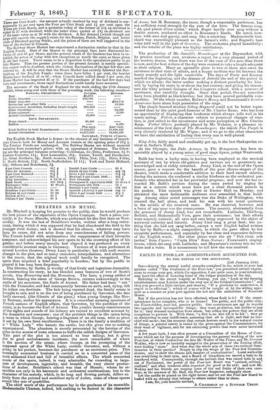Balfe has been a lucky man, in having been employed
as the musical assistant of one by whom obligations and services are so generously ac- knowledged and so richly rewarded. Jenny Lind, at the end of the Opera season, gave a concert for the benefit of the poor chorus-singers of the theatre, which made a comfortable addition to their hard earned salaries; during the autumn she conferred a similar kindness on the orchestral per- formers who attended her in her provincial progress; and now she has re- warded Mr. Balfe's services during the same period by singing for him at a concert which must have put a clear thousand pounds in his pocket. This concert was given at Exeter Hall on Monday, and attracted the most fashionable audience ever assembled in that build- ing. Among other noted personages was. the Duke of Wellington, who entered the hall alone, and took his seat with his usual quietness in the middle of the reserved seats. He was observed, however, and a burst of applause was the consequence. The concert, abstractedly from the presence of Jenny Lind, was not remarkable. Lablache, Thalberg, Belletti, and Mademoiselle Vera, gave their assistance; but their efforts were scarcely noticed; all eyes and ears being engrossed by the object of universal curiosity and interest. Jenny Lind sang a great deal; but no- thing that she had not sung before, except a new English ballad written for her by Balfe,— a slight composition, to which she gave effect by her exquisite performance, and especially by her clear and expressive delivery of the English words. Her other pieces were the air " Deh vieni, non tardar," from Figaro ; " Casta Diva" from Norma; Fioravanti's singing- lesson, which she sang with Lablache; and Meyerbeer's curious trio for twt flutes and a voice. It is unnecessary to tell how she was received.


























 Previous page
Previous page